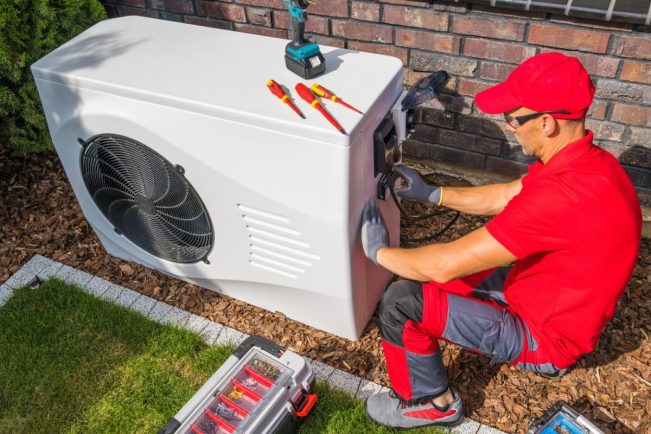The UK has witnessed a remarkable surge in qualified heat pump installers, with numbers soaring by 166% from around 3,000 in 2022 to nearly 8,000 in 2023, according to data from the Heat Pump Association (HPA). This expansion of companies and installers is likely part of the country’s transition towards cleaner energy systems, as per numerous policies put forth by the UK government.
Although the precise count of companies and individuals within the sector remains uncertain, industry experts suggest that the figure could be as high as 14,000, judging from prior trends. This significant uptick in qualified professionals is attributed to various government initiatives, including grants from schemes like the Home Decarbonisation Skills Training Competition and the Heat Training Grant.
The HPA expressed optimism that this uptick will persist. Heat Training Grant is expected to support approximately 6,000 additional heat pump trainees in England in the following year.
This increase comes on the heels of multiple different shifts in the heating industry and government policy. The phasing out of boilers in favour of less carbon-intensive technologies can also be seen in the Future Homes Standard (FHS) plan which plans to ease out the installation of gas boilers by 2035.
Some also view this increase as part of a fermenting interest in heat pumps and the growing investment in sustainable technologies by the nation. Policies such as the Boiler Upgrade Scheme and 0% VAT Scheme for eco-friendly technologies have played a role in this. However, there is still trepidation among customers.
Are heat pumps good for the consumer?
While installers and installations are rising, there are still issues pertaining to the costs of renewables. Air to air models are the cheapest and most popular on the market. However, the average air to air heat pump cost in the UK can range between £2,400 – £8,800 or even higher. Compared to a boiler, which can sometimes cost £1,000, this is a high investment cost.
However, in the long term, heat pumps can pay off for consumers. Most heat pumps can, under the right conditions, achieve energy efficiencies between 2 to 4 times higher than a boiler running at 98% efficiency. This results in ample savings over the many years the heat pump will be operating.
This does not necessarily mean that they will be immediately perfect for every home. There are some good pre-conditions a household should meet before they can fully benefit from a heat pump. For example, the home must be properly insulated to optimise its heating.
Similarly, an overly cold climate can decrease the efficiency of a heat pump in winter. In some cases, you need some form of frost protection or maintenance to properly keep the outside unit working. This factor can make the technology unviable for those in the coldest regions of the UK unless they opt for a high-temperature model, which has lower efficiency when operating at high temperatures (eliminating some of the advantages of cost savings).
While heat pumps can reduce home heating costs, they may not be adaptable to every environment. Many more powerful models like ground source heat pumps require a fair bit of free land, so they may not apply to smaller homes or apartments. They can be a good investment for many homes but not all.
Grants for homeowners in the UK
As a means of meeting their net-zero emissions target, the UK government is promoting a plethora of technologies like solar panels and heat pumps. With these initiatives, consumers can obtain varying degrees of help for improving their homes and especially their heating.
One of the more popular policies is the Boiler Upgrade Scheme, which allows homeowners in England or Wales to receive up to £7,500 towards their heat pump installation among other eco-friendly technologies like a biomass boiler.
The Energy Company Obligation Scheme is another that lets low-income households in England, Scotland, and Wales receive financial assistance to install energy systems and insulation. These are measures aimed at reducing a home’s carbon emissions.
The 0% VAT scheme, while not giving consumers a grant directly, slashes clean energy technology costs and will be available in the UK until 2027. It saves about £750 on installation costs for air to air source heat pumps.
Are heat pumps good for the environment?
Although heat pumps are considered good for the environment due to their high efficiency in heating and cooling buildings, there are some caveats. As mentioned above, they have a lower threshold of heat they can achieve compared to the many technologies on the market, so they are meant for homes that do not have extreme temperatures.
They do produce lower greenhouse gas emissions compared to traditional heating systems due to their use of renewables and lower power inputs. They can use electricity, geothermal heat, or the air outside to alter the temperature in a home. Consequently, when powered by renewable energy sources, heat pumps can significantly reduce carbon emissions and reliance on fossil fuels.
On the other hand, the environmental impact of heat pumps varies. The source of electricity they use as power is often generated from fossil fuels, which diminishes their benefits. They do contribute less of a carbon footprint than gas boilers but they are most effective when powered by solar panels.
There are also concerns about the manufacturing and disposal of heat pump equipment along with the materials they use, such as the coolant inside. These can also have environmental implications when not managed properly. Overall, they are better for the environment than gas heating despite some drawbacks.











